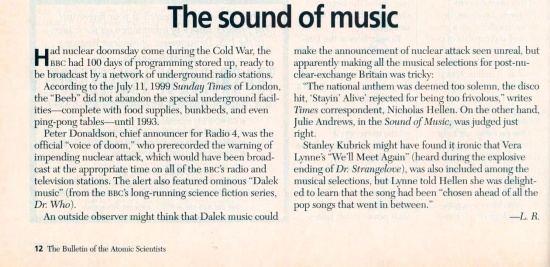The sound of music
- Publication: Bulletin of the Atomic Scientists
- Date: September/October 1999
- Author: Linda Rothstein
- Page: 12
- Language: English
Had nuclear doomsday come during the Cold War, the BBC had 100 days of programming stored up, ready to be broadcast by a network of underground radio stations. According to the July 11, 1999 Sunday Times of London, the "Beeb" did not abandon the special underground facilities-complete with food supplies, bunkbeds, and even ping-pong tables-until 1993.
Peter Donaldson, chief announcer for Radio 4, was the official "voice of doom," who prerecorded the warning of impending nuclear attack, which would have been broadcast at the appropriate time on all of the BBC's radio and television stations. The alert also featured ominous "Dalek music" (from the BBC's long-running science fiction series, Dr. Who).
An outside observer might think that Dalek music could make the announcement of nuclear attack seen unreal, but apparently making all the musical selections for post-nuclear-exchange Britain was tricky:
"The national anthem was deemed too solemn, the disco hit, 'Stayin' Alive' rejected for being too frivolous," writes Times correspondent, Nicholas Hellen. On the other hand, Julie Andrews, in the Sound of Music, was judged just right.
Stanley Kubrick might have found it ironic that Vera Lynne's "We'll Meet Again" (heard during the explosive ending of Dr. Strangelove), was also included among the musical selections, but Lynne told Hellen she was delighted to learn that the song had been "chosen ahead of all the pop songs that went in between."
Disclaimer: These citations are created on-the-fly using primitive parsing techniques. You should double-check all citations. Send feedback to whovian@cuttingsarchive.org
- APA 6th ed.: Rothstein, Linda (September/October 1999). The sound of music. Bulletin of the Atomic Scientists p. 12.
- MLA 7th ed.: Rothstein, Linda. "The sound of music." Bulletin of the Atomic Scientists [add city] September/October 1999, 12. Print.
- Chicago 15th ed.: Rothstein, Linda. "The sound of music." Bulletin of the Atomic Scientists, edition, sec., September/October 1999
- Turabian: Rothstein, Linda. "The sound of music." Bulletin of the Atomic Scientists, September/October 1999, section, 12 edition.
- Wikipedia (this article): <ref>{{cite news| title=The sound of music | url=http://cuttingsarchive.org/index.php/The_sound_of_music | work=Bulletin of the Atomic Scientists | pages=12 | date=September/October 1999 | via=Doctor Who Cuttings Archive | accessdate=22 November 2024 }}</ref>
- Wikipedia (this page): <ref>{{cite web | title=The sound of music | url=http://cuttingsarchive.org/index.php/The_sound_of_music | work=Doctor Who Cuttings Archive | accessdate=22 November 2024}}</ref>
